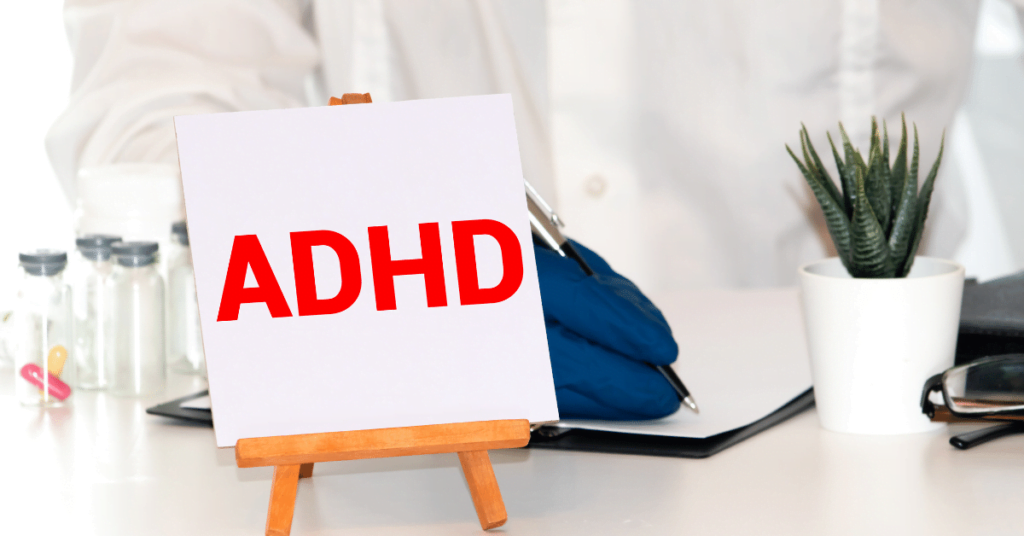Contents
What Is ADHD?
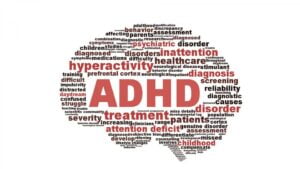
ADHD is a neurodevelopmental disorder that affects the way you think, feel, and behave. When you have ADHD, your brain doesn’t function as it should. It causes problems in regulating behavior, controlling impulses, focusing on tasks, remembering things, and being patient. These problems can be severe enough to lower your quality of life. ADHD is a common disorder that can cause problems on daily basis. Though some people may be able to cope with the disorder, many others require medication and other types of treatment in order to lead healthy lives. If you are concerned you have ADHD or ADD, talk to your doctor about ADHD treatment for adults.
ADHD is one of the most common mental disorders for children and adults. It often lasts into adulthood and has been found to impact more than 11% of adults. ADHD, or attention deficit hyperactivity disorder, is a mental disorder that affects about 5 percent of the world’s population. This common disorder usually begins in childhood and can carry through to adulthood. However, it can be difficult to differentiate whether or not a child truly has ADHD. As it shares many symptoms with other disorders and children go through various stages of development. Therefore, many children are misdiagnosed with ADHD when they are actually experiencing symptoms relating to another disorder.
Symptoms of ADHD in Adults
The ADHD symptoms vary depending on the type of ADHD the person has. General symptoms of adults with ADHD include:
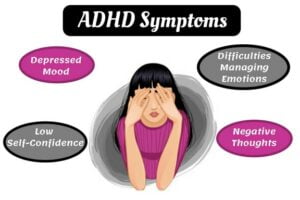
- Lack of impulse control
- Emotional outbursts
- Irritability
- Hyperactivity
- Difficulty concentrating
- Forgetfulness
- Running into things or people owing to not paying close enough attention
- Trouble organizing tasks or activities
- Problems completing tasks on time
- A tendency for procrastination or avoidance behaviors
- Low self-esteem
- Low motivation
- Disorganization
- Time management problems
- Procrastination
- Chronic lateness in finishing tasks or projects at home or work
- Impatience
- Tendency to lose things or forget appointments or deadlines
- Relationship problems due to exhibiting insensitive behaviors towards loved ones, not remembering birthdays or important events, forgetting important dates, and chronic lateness in returning calls or messages.
- Chronic low self-esteem due to feeling like you’re
- Adult Symptoms of ADHD are not strictly attributed to children, but rather they are common in adults.
Adult ADHD is often misdiagnosed as ADD because the symptoms are so similar. Some people may find it difficult to discern whether or not they truly have attention deficit disorder or if they are simply experiencing the symptoms of another disorder. In order to get a proper diagnosis, people should be aware of the symptoms, understand what causes them, and know how to find a specialist.
Diagnosis Of ADHD
ADHD is not only difficult to diagnose in adults but is also difficult for many patients to connect with their problem behaviors. Some of the most common ADHD symptoms adults struggle with include:
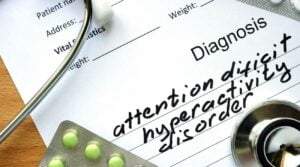
- Forgetfulness
- Disorganization
- Trouble managing time
- Impulsiveness
- Distractibility
- Impulsiveness
- Inattentiveness
Sometimes ADHD can be difficult to diagnose. As patients with ADHD often do not realize their condition. Many people with ADHD tend to accept their symptoms as a part of who they are. And in some cases, only seek treatment when faced with dire consequences such as job loss, divorce, or legal problems. Without knowing what they are doing wrong, many people with ADHD often do not change their behavior patterns at all.
Adults with ADHD may be more likely to abuse substances like nicotine, alcohol, or drugs than adults without the disorder. Nicotine and caffeine can help adult patients focus better when they have ADHD. However, they are not effective substitutes for ADHD medication. It is also important to note that people with ADHD are at risk of developing other psychiatric disorders. Such as anxiety, depression, obsessive-compulsive disorder, oppositional defiant disorder, or bipolar disorder. Some evidence suggests that patients with co-existing conditions experience more severe symptoms of ADHD than those with ADHD alone. Advances in technology have allowed more doctors to diagnose ADHD with the use of MRI scans. This type of scan uses radio waves and strong magnets to measure blood flow in specific areas of the brain. This can indicate whether or not a person has ADHD.
Treatment For Adult ADHD
ADHD is a disease that affects adults. Adults with ADHD may not have been diagnosed when they were children, or their symptoms may be different from those of a child. In order to get a proper diagnosis, people should be aware of the symptoms, understand what causes them, and know how to find a specialist. ADHD can affect people in several ways depending on the severity of the disorder and how it affects their lives. Some adults with ADHD receive treatment and learn to better cope with their disorder, while others continue to suffer from its effects. In addition to affecting adults’ daily lives, ADHD can also cause many other problems including depression and anxiety.
The most common cause of ADHD in adults is a brain injury or damage from birth complications that affect certain areas in their prefrontal cortex. Other less common causes include physical diseases (such as thyroid problems) and mental disorders (such as Bipolar Disorder).
ADHD is usually diagnosed through the use of several tests. Usually, these tests consist of rating scales that ask about ADHD symptoms in various ways. There are also neuropsychological assessments that measure brain functions to determine whether or not a person suffers from ADHD.
Treatment for ADHD is also available to adults, but it is different. ADHD typically becomes an adult-onset condition, so the symptoms are different. Treatment typically includes medications, psychotherapy or cognitive behavioral therapy, or a combination of these treatments. Treatment for ADHD in adults can include:
Medications
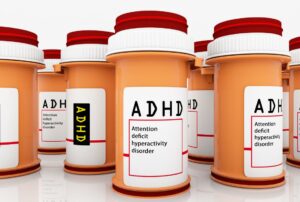 Drugs like Adderall, Ritalin, Concerta, and Vyvanse are generally used in the treatment of ADHD to improve attention spans. It is important to note that these medications do not cure the disorder but rather help manage symptoms by improving focus and impulse control. The most effective method of treatment for ADHD is stimulant medication such as dexmethylphenidate and methylphenidate. These drugs affect certain chemicals in the brain that can help strengthen areas that are underactive and improve concentration. However, some people may be prescribed other types of medications to treat specific symptoms such as depression or anxiety.
Drugs like Adderall, Ritalin, Concerta, and Vyvanse are generally used in the treatment of ADHD to improve attention spans. It is important to note that these medications do not cure the disorder but rather help manage symptoms by improving focus and impulse control. The most effective method of treatment for ADHD is stimulant medication such as dexmethylphenidate and methylphenidate. These drugs affect certain chemicals in the brain that can help strengthen areas that are underactive and improve concentration. However, some people may be prescribed other types of medications to treat specific symptoms such as depression or anxiety.
Psychotherapy
Psychotherapy helps people slow down, pay attention to details, improve their problem-solving skills, and develop more effective ways of coping with challenges. Therapy can help people with ADHD learn to set achievable goals and develop organizational skills.
Treatment for adult ADHD varies depending on how severe the disorder is, what other disorders are involved, and how it affects an individual’s life.
Cognitive Behavioral Therapy (CBT)
CBT is a type of therapy that helps patients identify inaccurate or negative thinking that causes problems in their daily lives. Patients are then taught how to correct these thoughts through goal setting, self-talk, positive reinforcement, etc.
Neurofeedback
Neurofeedback is a type of therapy that focuses on modifying brain waves to improve mental state and cognitive abilities. This therapy can be beneficial in providing relief from
Self-Management Strategies
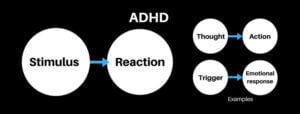
People with ADHD can also benefit from learning how to manage their own condition by using coping mechanisms such as time management, problem-solving, and organization skills. Self-management can include stress-management techniques and emotional coping strategies that may help adults with ADHD to be successful.
Parenting Strategies
Parents of someone with ADHD often benefit from participation in a support group, learning stress management strategies, and receiving special training on how to work effectively with their child. Some studies have shown that parent-training programs can come close to the effectiveness of ADHD medication in treating ADHD symptoms in children.
Graduated Driver Licensing Systems
These systems provide adults with specific guidelines for driving under different circumstances using a tiered system of rules, regulations, and consequences. So they can learn to effectively manage their disorder. This type of program has been shown to significantly reduce the number of crashes in young people with ADHD when studied by researchers in the Netherlands.
ADHD Coaching
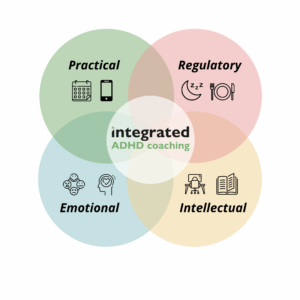 ADHD coaching is designed to help adults cope with any challenges they may be facing due to their disorder. Coaches work with patients to train them on how to set goals and build self-esteem. They also encourage positive thinking, problem-solving skills, and stress management techniques that will help patients manage their ADHD. To find an ADHD coach, visit ADD Coach Academy or the International Coach Federation.
ADHD coaching is designed to help adults cope with any challenges they may be facing due to their disorder. Coaches work with patients to train them on how to set goals and build self-esteem. They also encourage positive thinking, problem-solving skills, and stress management techniques that will help patients manage their ADHD. To find an ADHD coach, visit ADD Coach Academy or the International Coach Federation.
One study reported that coaching was helpful for adults with ADHD and led to significant improvements in multiple outcome measures, including coping skills and personal relationships. Businesses that offer support groups and resources for employees with ADHD include ACOEM and RIDC. ACOEM is the American College of Occupational and Environmental Medicine. ACOEM provides webinars, publications, teleconferences, and other resources for physicians about the diagnosis and treatment of ADHD in adults. The RIDC offers training courses to businesses across the United States for employees, including pre-course workbooks that give an overview of ADHD.
Attention deficit hyperactivity disorder affects about 5 percent of adults in the United States or approximately 10 million people. Adult ADHD is often not diagnosed until adulthood when patients are beginning to face challenges with job performance, personal relationships, or day-to-day challenges.
Tips To Cope With Adult ADHD
There are many tips to cope with adult ADHD-

- Find a way to cope with the symptoms of ADHD
- Accept that it will always be a part of you and find ways to deal with it or work around it
- Practice meditation and relaxation exercises
- Engage in physical activity such as yoga, swimming, and deep breathing
- Seek help through different methods of therapy, including phone counseling, Virtual therapy, counseling with a professional, support groups
- Stay focused on what you can improve in your life instead of dwelling on the things that are out of your control
- Reframe your thoughts to see the good in every situation rather than looking at it as bad or frustrating
- Make lists and set goals for each task you need to accomplish
- Avoid procrastination or distractions that keep you from completing your daily tasks
- Treat yourself to a special moment every day, whether it be by buying yourself something, watching your favorite show, or spending time with family and friends
- Visualize the process of achieving your goals as having several steps, and work on accomplishing each one (the key is to NOT give up!)
- Keep track of your daily progress so you can see how much you’ve accomplished
- Set realistic goals and reward yourself for achieving those milestones
- Read as much as you can about ADHD so that you gain a better understanding of how to work around your symptoms
- Realize that every day won’t be perfect and that everyone has their own struggles to deal with
- Surround yourself with people who will motivate and encourage you rather than bring you down
- Be patient with yourself, as it takes time to master new skills
- If you are feeling overwhelmed or incompetent, try asking for help or guidance from someone whom you trust
- Take care of your physical well-being by eating healthy food and staying active
- Take note of what you find most challenging and try to rework your schedule around those tasks
- If you are in a relationship, make time to spend with your partner
- Agree on what signals or requests each person needs in order to communicate more effectively
- Talk about the best ways for both people to contribute positively to the relationship
- If there are children in your family, make sure they know what to do if you begin acting differently (eagerly jumping up and down or picking up toys)
- Let them know that it is not their fault if you act this way
- When you feel overwhelmed with stress, use your “mad-moments” as learning experiences, and remember that you will make it through
- If you are holding something or fidgeting with your hands, try wearing gloves or using lotion to keep your skin soft
- Drink lots of water throughout the day
- Listen to music while working
- Reward yourself for completing
Conclusion
It can be difficult to cope with Adult ADD/ADHD. The tips we have provided should help you get started thinking about how you can work around your symptoms, or improve them in some way. If all of this sounds overwhelming and you want a team of experts to create an ADHD strategy for you, let us know. Our healthcare experts are waiting by the phone ready to partner with you to deal with ADHD.
For more information, please contact MantraCare. ADHD is a neurodevelopmental disorder characterized by difficulty in paying attention, hyperactivity, and impulsivity. If you have any queries regarding Online ADHD Counseling experienced therapists at MantraCare can help: Book a trial ADHD therapy session
